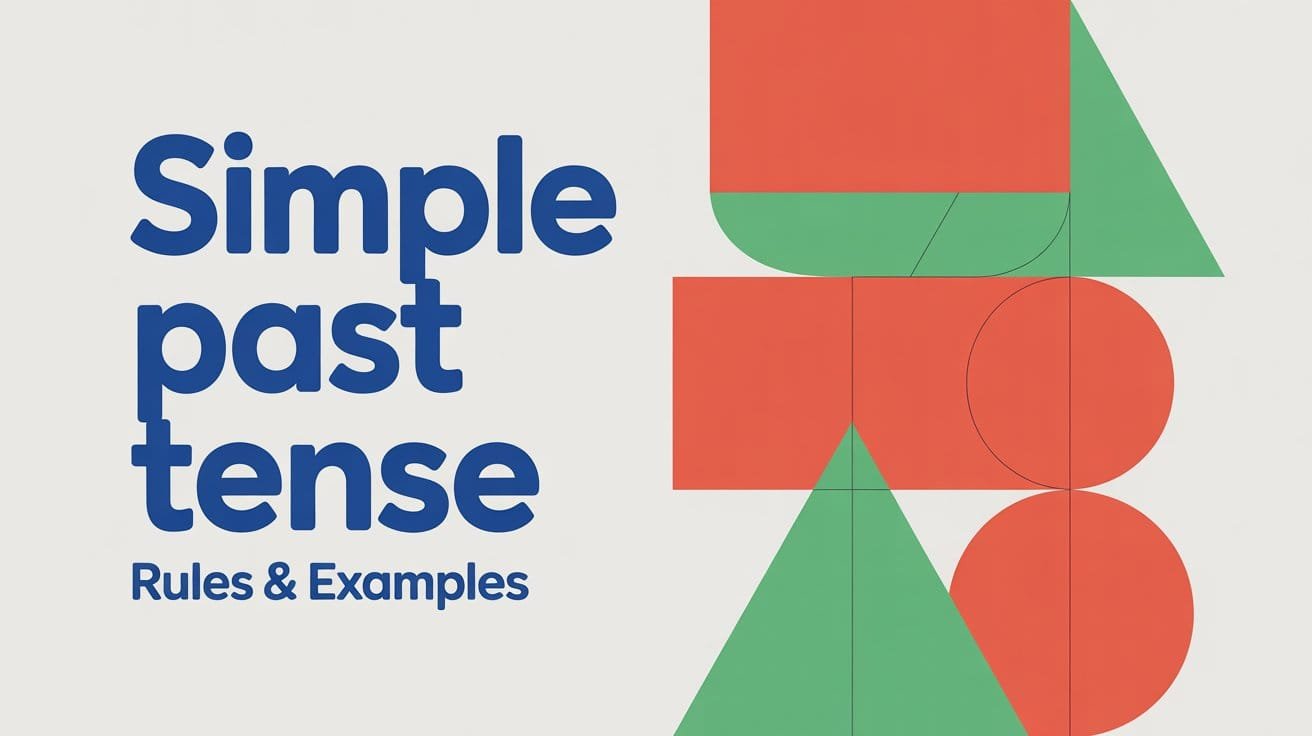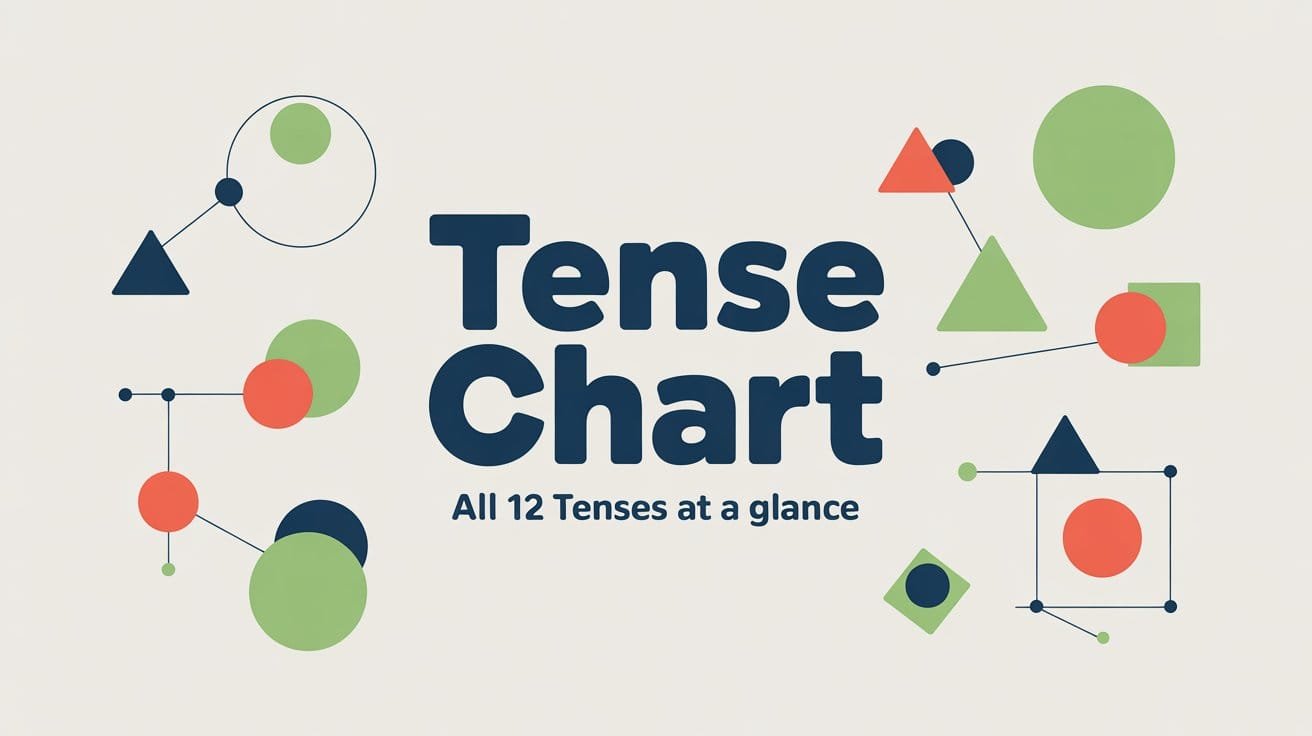The simple past tense is used to describe actions that were completed at a specific time in the past. Whether you’re telling a story, sharing an experience, or listing past events, this tense helps anchor your ideas in a clear time frame.
We use the simple past for actions like “She left the office at 6 PM” or “They watched a movie last night.” It’s one of the most useful tenses for everyday conversations, especially when talking about what happened.
Structure of the Simple Past Tense
The simple past tense describes actions that started and ended in the past. It uses the past form of the verb—either regular (ending in -ed) or irregular (which may change entirely).
Affirmative Sentences
Structure:
Subject + past form of the verb
For regular verbs, add -ed to the base form.
For irregular verbs, the past form must be memorized.
Examples:
- I visited my grandparents last weekend. (regular)
- She baked a chocolate cake. (regular)
- They went to the museum on Sunday. (irregular)
- He wrote a review after the event. (irregular)
Negative Sentences
Structure:
Subject + did not (didn’t) + base form of the verb
Even if the verb is irregular, the base form is used after did not.
Examples:
- I didn’t like the final episode.
- She didn’t attend the conference.
- We didn’t take any photos.
- He didn’t feel well yesterday.
Interrogative Sentences
Structure:
Did + subject + base form of the verb?
To form questions, start with Did, followed by the subject and the base form of the verb.
Examples:
- Did you enjoy the concert?
- Did he call you back?
- Did they finish the task on time?
- Did she travel alone?
Usage of the Simple Past Tense
The simple past tense is used when an action or event happened and ended in the past. It doesn’t matter whether the action was long or short—what matters is that it’s complete.
Completed Actions in the Past
Use the simple past to talk about events that are over, often with a specific time reference.
Examples:
- She submitted the report yesterday.
- They left the restaurant at 9 PM.
- We met them at the train station.
A Series of Past Events
It’s commonly used in storytelling or recounting events in order.
Examples:
- He entered the room, turned on the light, and sat down.
- They packed their bags, checked out, and took a taxi to the airport.
- I woke up, made coffee, and started reading.
Past Habits or Routines
Use the simple past for repeated actions or behaviors in the past that no longer happen.
Examples:
- She played tennis every weekend when she was in college.
- I always walked to school in the winter.
- They watched the same show every Friday night.
Common Time Expressions with the Simple Past Tense
The simple past tense is often used with time expressions that clearly place the action in the past. These phrases help signal when something happened and reinforce that the action is complete.
Common Time Expressions
- yesterday
- last night / last week / last year
- an hour ago / two days ago / a few minutes ago
- in 2005 / in June / in March
- on Monday / on my birthday
- when I was a child
- earlier today
- the other day
- once / twice / many times (when used with a completed past action)
Examples:
- I watched that movie last night.
- She moved to this city two years ago.
- We met him on Friday.
- He called an hour ago.
- They lived in Spain when they were students.
Regular and Irregular Verbs in the Simple Past
Verbs in the simple past tense fall into two main categories: regular and irregular. Knowing the difference helps you use the correct past form in both writing and speech.
Regular Verbs
Regular verbs form the past tense by adding -ed to the base form.
Examples:
- walk → walked
- clean → cleaned
- talk → talked
- play → played
Examples in sentences
- She cleaned her desk this morning.
- They played basketball after school.
- I watched a documentary last night.
Spelling Tips for Regular Verbs:
- If the verb ends in -e, just add -d: love → loved
- For verbs ending in a consonant + y, change y to i and add -ed: carry → carried
- For one-syllable verbs ending in a vowel + consonant, double the consonant: stop → stopped
Irregular Verbs
Irregular verbs do not follow a predictable pattern. Their past forms must be memorized.
Examples:
- go → went
- eat → ate
- write → wrote
- buy → bought
- see → saw
Examples in sentences:
- He went to the dentist on Tuesday.
- We ate at the new restaurant last weekend.
- She wrote a detailed report.
- They bought tickets online.
Practice Tips for Using the Simple Past Tense
To get comfortable with the simple past tense, it helps to use it regularly in realistic situations. These strategies will strengthen your understanding and fluency.
Keep a Short Daily Journal
Write 2–3 sentences about what you did each day. Focus on completed actions.
Example:
Today, I visited the library and checked out two books.
I made lunch and called my friend in the afternoon.
Retell a Past Event
Think of something you did recently—like a weekend activity or a trip—and describe it in past tense.
Example:
Last Saturday, we went to the park. We played frisbee and had lunch under the trees.
Use Flashcards for Irregular Verbs
Create a set of flashcards with the base form on one side and the past form on the other. Practice until the changes feel natural.
Example:
Base: drink → Past: drank
Base: speak → Past: spoke
Practice Short Conversations
Write or roleplay basic dialogues using past-tense questions and answers.
Example:
A: Did you see the message?
B: Yes, I read it this morning.
Frequently Asked Questions About the Simple Past Tense
What is the simple past tense used for?
The simple past tense is used to describe actions that started and finished in the past. It’s commonly used to talk about completed events, past routines, or a sequence of past actions.
Example: I visited my aunt last weekend.
How do I form negative sentences in the simple past?
Use did not (didn’t) followed by the base form of the verb.
Example: She didn’t attend the class.
Even if the verb is irregular, always use the base form after “did not.”
Incorrect: She didn’t went.
Correct: She didn’t go.
What’s the difference between regular and irregular verbs in the past tense?
Regular verbs end in -ed (e.g., played, cleaned), while irregular verbs have unique past forms that must be memorized (e.g., go → went, buy → bought).
Can I use time expressions like “yesterday” with the simple past?
Yes. Time expressions such as yesterday, last night, a week ago, and in 2010 are commonly used with the simple past to indicate when the action happened.
Example: He left an hour ago.
Is the verb form different in questions?
Yes. In questions, use Did + subject + base verb.
Example: Did they enjoy the concert?




thank you so much. This is such a great help with simple explanations and basic examples.